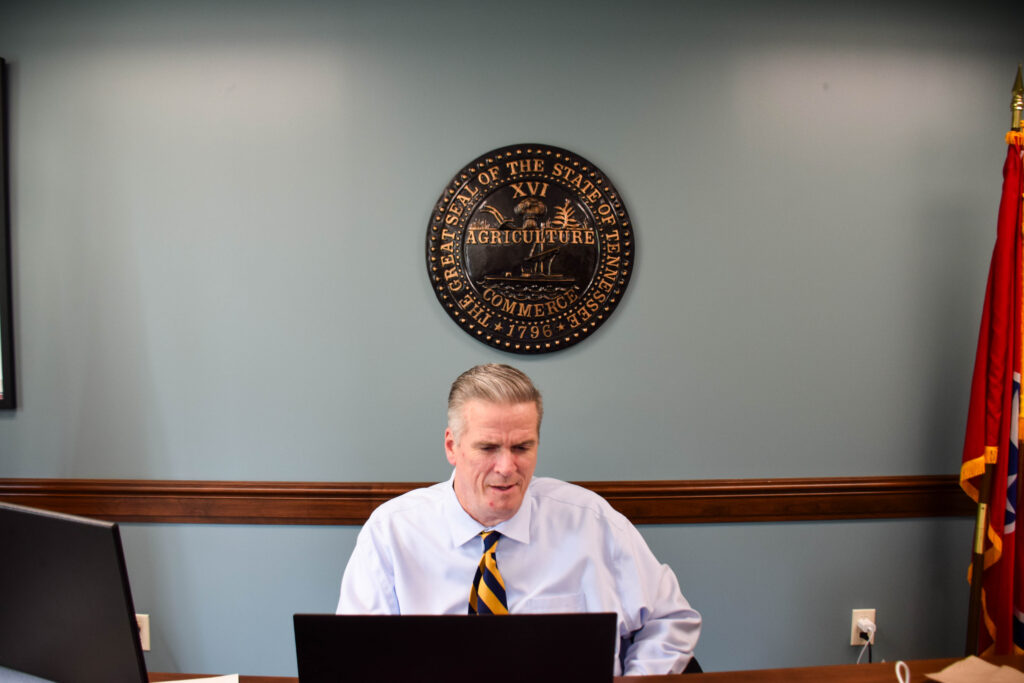
When lawmakers headed home after the latest Tennessee legislative session, it was more than just a seasonal ending for some. It also marked the end of statehouse careers for those like Darren Jernigan.
After more than a decade of representing Old Hickory, the Democrat is leaving the capitol for an office just a few blocks away: Nashville city hall. There, under the mayoral administration, he’ll be the liaison between city and state governments.
It’s a role that will require relationship building — a skill he’s been working on during his 12-year statehouse career, and that was on full display when he introduced the final bill of his tenure on the House floor. A flock of his colleagues — who span the political spectrum — stepped to the microphone to commend him on his work.
Sam Whitson, a Republican from Franklin who also bowed out of reelection this year, spoke of their friendship.
“I was blessed to sit next to you my first two years on the back. We argued. We still argue, we disagree, but you do it with such grace and humility,” Whitson said. “You’re one of the finest persons I’ve ever met in my life.”
This ability to look past partisanship is something Jernigan sees as an asset. It helped him pass legislation to end child marriage and cousin marriage, to establish a registry for aggravated animal abuse, and to improve parking for wheelchairs users, like himself.
It’s also an ability that extends beyond the Capitol.
“You don’t do it to pass bills,” Jernigan said. “I like these people. Their politics are sometimes horrific, but would they drop everything and come pick me up if I was stranded somewhere? No question. Salt of the earth.”
Jernigan’s political background was born out of feeling unheard by his own representative. This encouraged him to run for the seat. While he initially lost, he was able to garner some name recognition.
Jernigan recalled a story he once heard from a family member:
“There was a man who put his mule into the Kentucky Derby. And people say, ‘Why are you putting your mule into the Kentucky Derby? He’s not going to win.’ He says, ‘Yeah, you may not win, but the association would do him some good,’ ” Jernigan said. “You know, whenever they say his name and his name, and then my name’s next … I think that may have contributed to why, maybe two years later, I get appointed to the Utility District board.”
Following the appointment to that board, Jernigan was elected to Nashville’s Metro Council, and, in 2012, to the statehouse.
After more than a decade at the capitol, he’s not unrealistic about Tennessee politics — which, he says, has lost some of its “civility and decorum.” Last year, the General Assembly also passed a slew of bills overriding Nashville’s right to self-governance, and leading the city to file four lawsuits.
But Jernigan sees the situation — a progressive city council and a conservative legislature — as one predicated on necessity.
“Neither one of them are going away. So we have to talk,” Jernigan said. “We need each other. Nashville’s one third the economic engine for the state you’re in, and, make no mistake, our [Metro Charter] can be dissolved by the state.”
Understanding this relationship will be crucial in his new role, where he’ll be bridge-building between the mayor and the legislature.
Mayor Freddie O’Connell already credits Jernigan with easing some of the “anti-Nashville activity” in the aftermath of last year’s preemption bills.
“We wanted somebody who would be able to — not only themselves have those great relationships — but also help give us some guidance on the best way to engage in conversations with the state,” O’Connell said.
Jernigan says he’s excited to continue to serve in this capacity, as he’s unlikely to run again for state office. However, he knows the work ahead could be challenging.
“There’s no magic bullet,” Jernigan said. “So, it’s going to take some time.”

